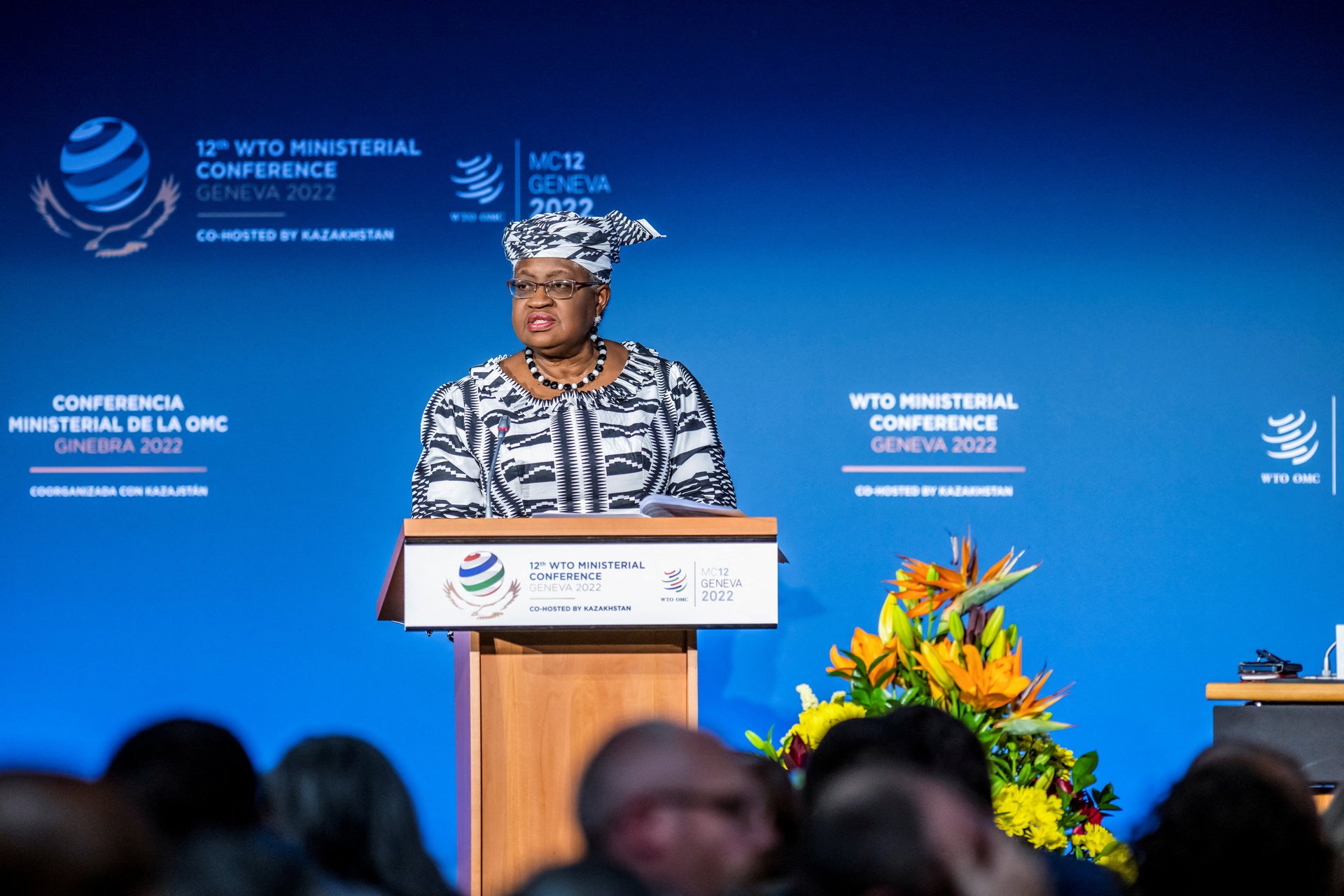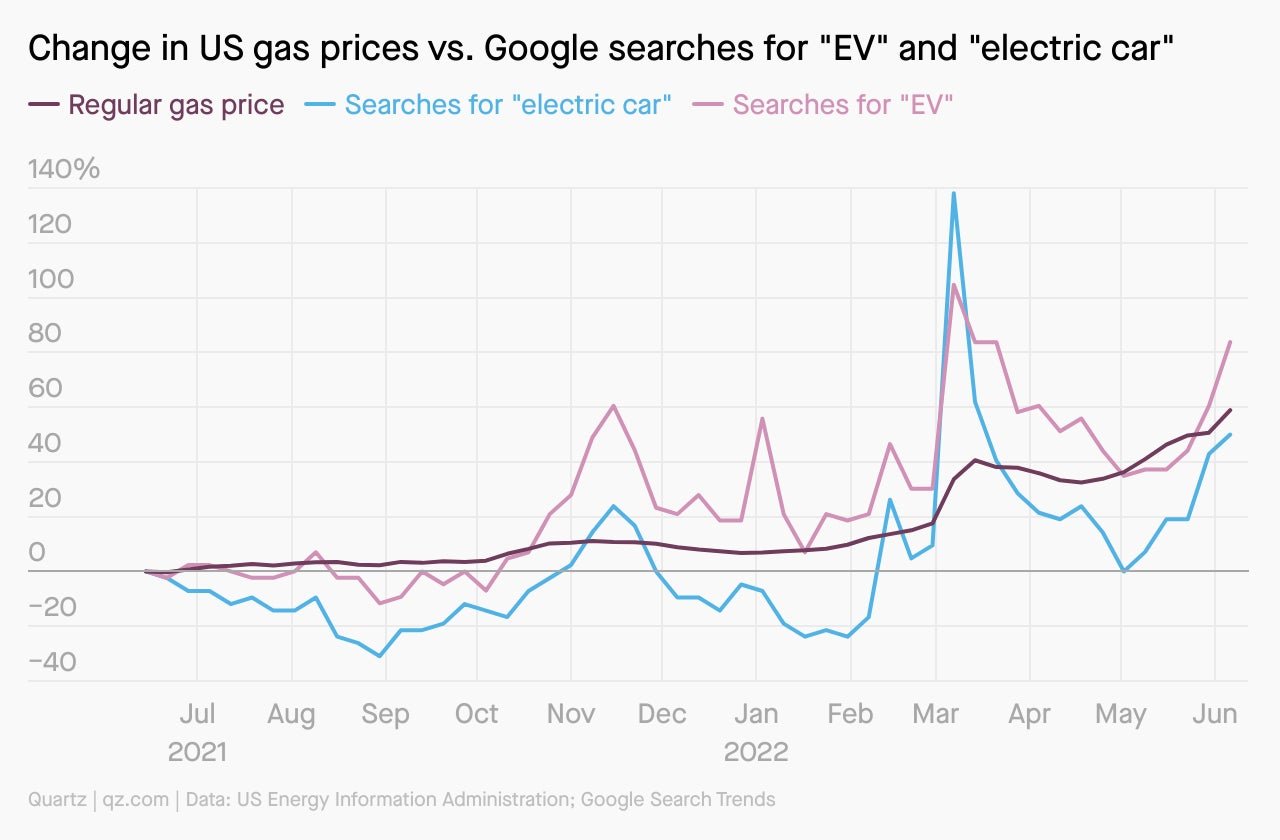🌍 It’s a polycrisis
Good morning, Quartz readers!


Good morning, Quartz readers!
Here’s what you need to know
The World Trade Organization is having its first high-level meeting in almost five years. The priorities are covid patent release and the hunger and energy emergencies amid what WTO chief Ngozi Okonjo-Iweala called a “polycrisis.”
Russia’s oil sales are still at record levels. Since the invasion of Ukraine, Russia made nearly $100 billion from fuel exports, and prices are up 60% from last year.
Wall Street is entering bear territory. With high inflation and the looming risk of a recession, the markets continue to decline, recording an overall loss of 20% from the year’s previous high. Bitcoin is in choppy waters, too, and dropped 18% in a day.
The UK will begin deporting asylum seekers from various countries to Rwanda. A court appeal failed to stop the controversial agreement, which the United Nations said sets a “catastrophic” precedent.
Supply chain disruptions and inflation came for tampons. The shortages are lasting longer than with other essential products, arguably reflecting the priorities of the mostly-male executives of tampon makers.
What to watch for
It’s been a week since truck drivers in South Korea went on strike to protest working conditions and pay, and there’s no resolution in sight. The strike has forced companies such as Hyundai Motors and Korean steelmaker Posco to slash production at some of their plants.
It’s the latest supply chain disruption rocking the automobile, semiconductor, and steel industries, all of which have been trying to rebound from covid lockdowns and challenges caused by Russia’s invasion of Ukraine. The latest setback just keeps adding up:
1.6 trillion won ($1.25 billion): Cost of production and shipment disruptions from the strike so far
3,800: Cars the strike has cost Hyundai
640,000: Tires that have faced shipping issues
100: Cargo trucks the Korean government is consigning from its military to carry goods
30+: Business groups that have called for the strikers to stop
Fueling interest in EVs
Expensive gasoline is prompting drivers to give electric vehicles (EVs) a go. Gasoline prices in the US crossed the $5 per gallon threshold last week. While not the highest price ever, it’s still the highest in recent memory.
No wonder interest in alternatives to gas-guzzling engines has spiked, too. Since the start of May, US Google searches for “electric car” are up by half and searches for “EV” are up by a third.

Increased awareness in EVs may not translate into sales. Like the broader auto market, EVs have been affected by supply chain problems, including disruptions in China. EVs are also generally more expensive than fossil fuel-powered vehicles, although they tend to be cheaper to own once you factor in tax incentives and the lifetime cost of fuel and maintenance. Luckily for those who’ve googled EVs but balked at the price tag, more affordable models are set to launch next year.
A look inside Tasty, And That’s It
Russia’s new McDonald’s is Tasty, And That’s It. After the American fast food chain left Russia in response to the invasion of Ukraine, the restaurant’s former locations were reopened by its subsidiary Vkusno & Tochka, which means, “Tasty, and that’s it.”
Over the weekend, more than a dozen outlets that were previously McDonald’s locations opened under the new branding, which is a minimalistic depiction of a burger and two fries with the slogan, “The name changes, love stays.”

As Quartz reporter Michelle Cheng explains, the changes, which include blackouts of the McDonald’s logo on ketchup and sauce packets and the use of plain white soft drink cups, mark a new trend toward isolation.
✦ Love stories like these? Support our journalism by becoming a Quartz member. Sign up today and take 40% off.
Surprising discoveries
A kiss goodbye. Saudi Arabia, the United Arab Emirates, and other Gulf countries have banned Disney’s new film, Lightyear, over a same-sex kiss scene.
AI feel fine. A Google engineer has been put on leave after claiming that the internet giant’s new Lamda AI has developed a conscience, and its desires should be respected.
There’s nothing good on TV. In a study by Scottish and Finnish universities, monkeys were given a choice between triggering video content or audio, and they chose the latter.
Backup Ukraine. Ukrainian citizens are using their phone and an app called Polycam to preserve augmented reality models of artifacts, buildings, and other culturally significant objects.
Would we have podcasts without Apple? Almost certainly yes, but the company ushered in a new platform that helped make the medium so popular. Learn how in the latest episode of the Quartz Obsession podcast.
🎙 Listen on: Apple Podcasts | Spotify | Google | Stitcher
Our best wishes for a productive day. Send any news, comments, AI friends, and zoo tunes to [email protected]. Reader support makes Quartz available to all—become a member. Today’s Daily Brief was brought to you by Sofia Lotto Persio, Annalisa Merelli, and Morgan Haefner.